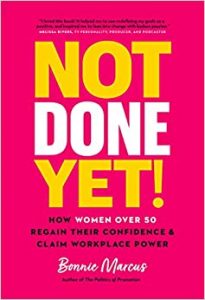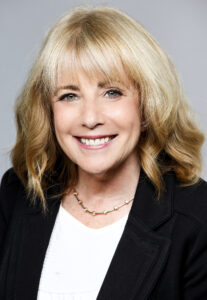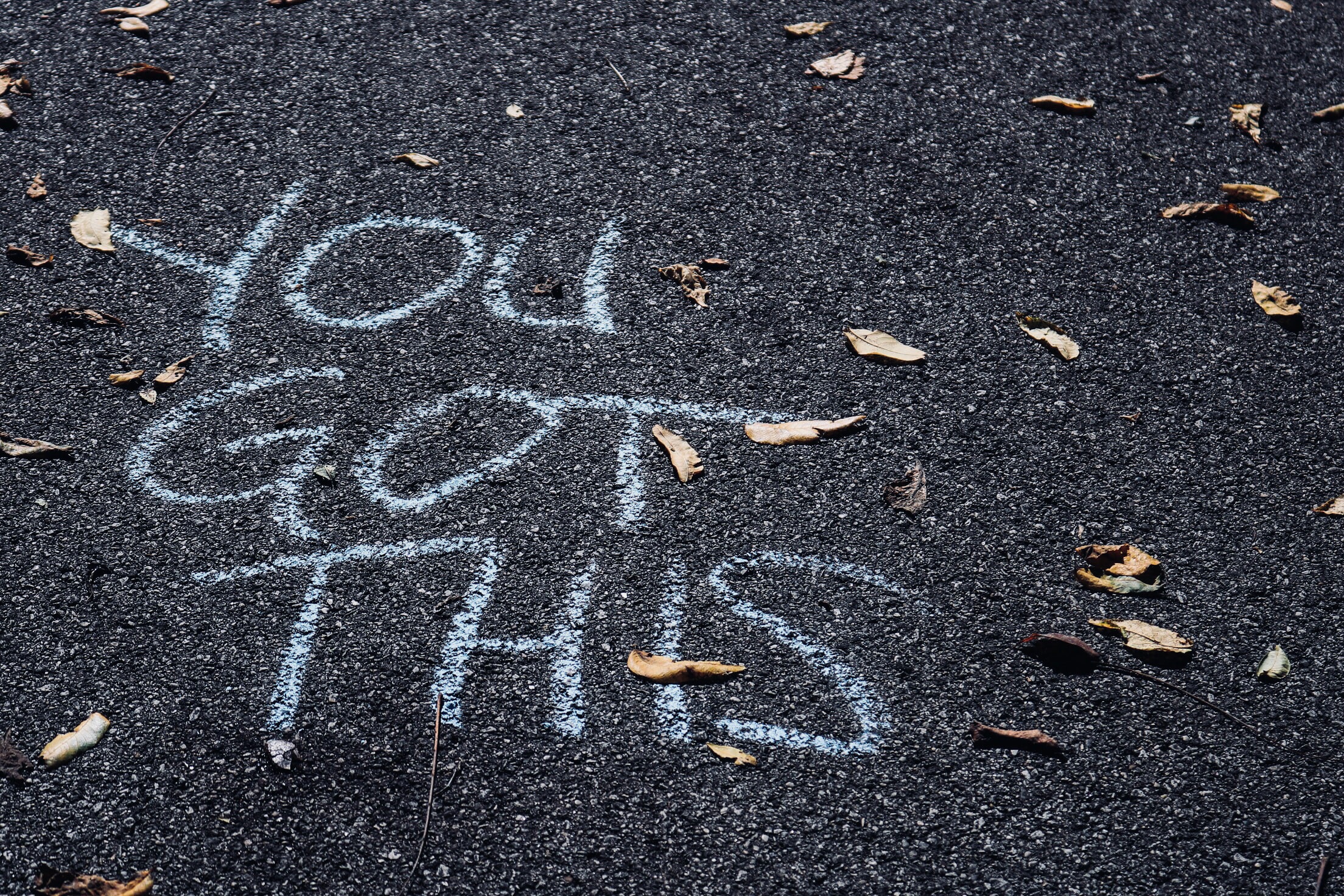Not Done Yet
Women have made significant advances in the workplace but still face pay inequity and underrepresentation in top positions. Bonnie Marcus says that the situation looks worse for older women as they face what Bonnie Marcus calls “the double whammy of gendered ageism.”
In her new book, Not Done Yet: How Women over 50 Regain Their Confidence and Claim Workplace Power, Bonnie Marcus shares how to navigate the challenges of the workplace while defying all of the assumptions. Bonnie is an executive coach and Forbes contributing writer who has been honored by Global Gurus as one of the world’s top 30 coaches.
I reached out to her to talk about her findings.
Women have been particularly hard-hit during this pandemic. Add that to pay inequity and underrepresentation, and I’m curious about the state of the workplace for women.
Women represent 54% of all job losses due to the pandemic. For older unemployed women facing age discrimination, they are likely to be unemployed longer and when they land a job, they often have to take a significant pay cut.
According to the Urban Institute, when personal and job characteristics are held constant, jobless women are 18 percent less likely to find new work at age 50-61 than at age 25-34. At 62+, they are 50 percent less likely to be rehired.
The women I interviewed for Not Done Yet! shared with me their challenges finding comparable employment and compensation after losing their jobs. Many of these women, at mid-level and above, have pursued new positions for over two years. Prospective employers show little interest in the value of their experience and achievements, and they’re often told they’re over-qualified or they don’t fit into the ‘youth’ culture.
Women 50+ who remain in the workplace experience gendered ageism as they show visible signs of aging. Called out as being ‘over the hill’ and the subject of ageist jokes and comments, they are also marginalized and viewed as less valuable than their younger colleagues.
Demeaning remarks about older people create an environment of fear, especially for those of us who feel the pressure to remain youthfully attractive to stay employed.
Many of the women I spoke with shared with me that their ideas and opinions are easily dismissed, they are no longer invited to key meetings, and their workload often re-distributed.
Though some companies are now demonstrating more of a commitment to DEI initiatives, very few, if any, recognize ageism as part of their implicit bias training. And the intersection of age and gender isn’t even on their radar.
What are some of the best strategies you’ve seen that help women regain their confidence?
It’s important for women 50+ to recognize the ageist assumptions and stereotypes they have likely internalized. They need to identify what holds them back and reframe the negative mindset that their age affects their relevance. These beliefs erode their confidence and they no longer feel they have what it takes to remain marketable.
We accept these assumptions as the god-given truth. And the real danger is that, over time, we accept them as our limitations. As we internalize these beliefs, we diminish ourselves, keep ourselves small, and, as a result, accelerate our aging and jeopardize our health.
One of the exercises in the book is to write the current story you tell yourself about yourself. If this story sabotages your confidence and ongoing success, you need to rewrite a new empowering story. Keep that new story visible, read it each day, and create positive affirmations from it to foster a positive mindset that boosts your confidence.
The bottom line is that if you believe that you’re too old to compete, too old to get promoted, that you are no longer relevant or valuable, then you will hold yourself back from doing what you need to do to stay marketable. You withdraw, stay silent, and therefore, are perceived as having little value to contribute. You are more likely to lose your job as a result.
What advice do you have for women over fifty to overcome the “double whammy” of gender ageism?
All of the career advice I give in the book is advice you should follow throughout your entire career. But if you’re a woman over 50 and therefore more vulnerable to being marginalized or pushed out, you need to be more vigilant about doing the things you need to do to stay marketable and keep your job. Here are a few tips:
Be visible.
Make it your intention to create visibility for yourself. Think about the best way to stay on people’s radar and make a plan. You might include things like volunteering for special projects to running a company-wide event, getting involved in affinity groups or women’s leadership initiatives. Attend company social events, offer to mentor younger colleagues. The point here is that you need visibility to avoid being pushed aside and considered irrelevant.
Declare your ambition.
It’s important that your manager know that you’re still invested in your job and doing your best work. Schedule a meeting with your manager and get their input on how you can best continue to add value to your team, your department, and your company.
Cultivate a growth mindset.
Be proactive and have a sense of urgency here. Take a look at your current kills and experience. What skills need improvement? What new skills do you need to stay on top of your game? Don’t allow yourself to fall behind the curve.
Raise your hand, share your ideas.
Let’s face it. If you stay silent, you set yourself up to be overlooked and marginalized. You want to make sure that people know you have great ideas and valuable opinions. Ask for the meeting agenda ahead of time. Prepare your thoughts on the topic so you can confidently raise your hand to share.
“Own your age” is contrarian advice in a world obsessed with looking younger. Tell us more about your perspective.
Because of society’s emphasis on youth, as we age we feel ‘less than’ and apologetic about our age. It’s important to understand how our age has gifted us many valuable experiences and lessons; how these experiences have resulted in increased wisdom and savvy. Owning our age means embracing our journey and the power of our personal and professional story. This wisdom is extremely valuable to our colleagues, our businesses and society.
Ask yourself, what battles have you fought and won? Celebrate who you are and your life journey.
Talk about some of the mindset shifts that you recommend in order to succeed. You experienced a big one when you struggled with Lyme disease.
Lyme disease challenged me in many ways. I no longer had the desire or energy to do anything. I was exhausted and had very little ability to focus for months. I learned the best path forward was to take a step back, be present, choose joy and see the glass half full, and go with the flow. I was forced to recognize that my path to healing involved becoming more aware of the mind body connection and that my happiness and success comes from an inner knowing and acceptance of who I am and what I am capable of contributing to the world.
You have a section on power and talk about how women give away power too easily. Why is that? What can you do to stop this or even enhance your power?
Our society has a negative view of powerful women, who are often labeled as nasty and perceived as willing do anything to get ahead. Their motives are challenged even though powerful men are not viewed with this same bias. As a result, women often eager to please others and be liked, keep themselves small and put others first, pushing their own ambition aside. They are conditioned to play small.
I suggest you keep a list of when you feel powerless and what triggers you to give your power away. This awareness is the first step. Then plan to take it back.
 How and where do you learn to be politically savvy?
How and where do you learn to be politically savvy?
We can learn to be politically savvy every day as long as we pay attention to what’s going on around us. Make it your intention to understand the workplace dynamics. What are the rules and unwritten rules? Who has power and influence? How does the culture inform you about what it takes to be successful, especially as a woman? Answering these questions trains you to be more politically savvy.
What has the response been to your book so far?
Women over 40 (and men) feel empowered after reading the book. They are grateful that I am bringing attention to what they are experiencing in the workplace every day. Many have suffered in silence, afraid to complain about ageist policies and practices and behavior, for fear it will bring attention to their age. They are grateful that the book gives them a voice to declare out loud that they’re Not Done Yet! as well as the guidance to step into their workplace power and own the wisdom and value of what they bring to the table.
For more information, see Not Done Yet: How Women over 50 Regain Their Confidence and Claim Workplace Power.
Image Credit: Sydney Rae

